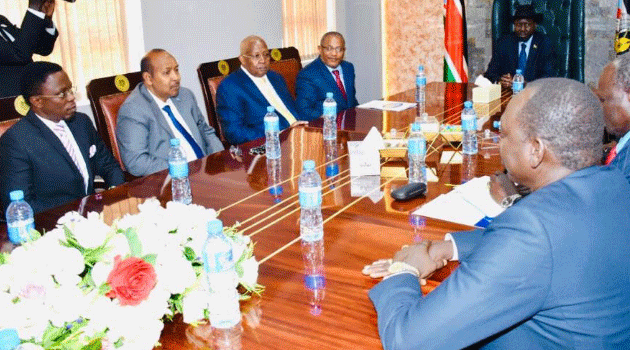
Kenya’s Cabinet Administrative Secretary at the Foreign Affairs Ministry Ababu Namwamba was part of the IGAD delegation. Photo/COURTESY.
NAIROBI, Kenya, May 9 – The 67th Extraordinary Session of the Inter-Governmental Authority on Development (IGAD) Council of Ministers has endorsed a six-month extension of a pre-transitional period for a unity government in South Sudan.
The ministers however, directed parties to the Revitalized Agreement on the Resolution of the Conflict in the Republic of South Sudan (R-ARCSS) signed in Addis Ababa on September 12 last year, to take necessary steps to expedite the implementation of impending tasks within the extended non-renewable timeline.
The extension to an initial eight-month transitional period scheduled to lapse on May 12 was unanimously endorsed by parties to the September 12 R-ARCSS last Friday.
An eight-member delegation of the IGAD ministers met South Sudan President Salva Kiir Wednesday ahead of the anticipated arrival of his former Vice President and political foe Riek Machar in Juba for the implementation of R-ARCSS.
The contingent comprising of among other regional ministers Kenya’s Foreign Affairs Chief Administrative Secretary(CAS) Ababu Namwamba, Uganda’s Foreign Minister Sam Kutesa, and Ethiopia’s Gedu Andargachew briefed Kiir on progress made in the rollout of a peace deal inked in Addis Ababa last September.
Namwamba cautioned against a further extension to the transitional period insisting that the current extension should be a one-off.
“It is essential that we stick to the timelines and the targets in the implementation of the R-ARCSS in its fullness. Further, the 6-month window must not be misconstrued as a window for renegotiation of any aspects of the peace agreement in its letter and spirit but must rather be seen as a logistical opportunity to get our act together on the pending implementation milestones,” he said.
The meeting at Kiir’s J1 State residence came at a time May 12 deadline for the Addis Ababa accord signed by Kiir and Machar was nearing an end with no clear sign of its implementation.
The United Nations Special Representative of the Secretary-General for South Sudan, and Head of the UN Mission in Juba, David Shearer, recently told a news conference at the UN headquarters in New York that Machar had expressed his commitment to the peace deal during a meeting in Khartoum.
“He (Machar) told me that he is committed to coming back still at the end of May,” he said.
Kenya’s Foreign Office tweeted on Wednesday that the 67th Extraordinary Session of the IGAD Council of Ministers held in Juba from Tuesday had “agreed that the trajectory of peace, stability and prosperity of South Sudan must be sustained.”
Machar’s SPLO-IO representative in the National Pre-Transitional Committee (NPTC), Puot Kang Chol, was recently quoted by the AFP saying security setbacks had impeded his return to Juba from Khartoum in the neighboring Sudan.
A joint communiqué released by IGAD on May 3 after parties to the R-ARCSS convened indicated a six-month extension had been agreed on to allow “the execution of critical pending tasks,” including security concerns raised by Machar which Kiir’s administration has repeatedly assured have been addressed.
“The outcome of the meeting includes the agreement in principle for extension of the Pre-Transitional Period for six months to be tabled for consideration at the upcoming 67th Extraordinary Session of the IGAD Council of Ministers that will be held on 7th to 8th May in Juba, South Sudan,” an IGAD communiqué released on May 3 read.
The joint statement by the R-ARCSS had singled out delayed unification of government forces (Sudan People’s Liberation Army) and those allied to Machar (Sudan People’s Liberation Army-In Opposition) as a major hurdle in the implementation of the Addis Ababa peace agreement.
“The Parties observed that key Pre-Transitional tasks that are critical for the formation of the Revitalized Government of National Unity such as the cantonment, screening, training, unification and deployment of forces and the determination of the number and boundaries of state are pending.”
Lack of political will and cash-constraints were also cited as reasons for the delayed constitution of the transitional government.
“The Parties identified lack of political will, financing and time constraints as the major challenges that have delayed implementation of the Pre-Transitional tasks and underscored the need to ensure that specific pending tasks are adequately funded within a clearly set out and reasonable timeframe,” the May 3 statement indicated.
IGAD States – Kenya, Ethiopia, Uganda, Djibouti, Eritrea, Somalia, and Sudan – last year failed to commit the warring parties to a July 9 presidential election later resorting to a transitional arrangement.
The June (2018) IGAD summit also attended by President Uhuru Kenyatta saw the Kiir and Machar meet publicly for the first time since their fallout following a failed coup attempt in 2013.
South Sudan’s parliament has voted in the past to extend Kiir’s presidential term to July 9, 2018 after putting off the first post-independence presidential election on July 9, 2015.
Kiir served as Sudan’s First Vice President from 2005 until South Sudan gained its independence from the north in 2011.








































